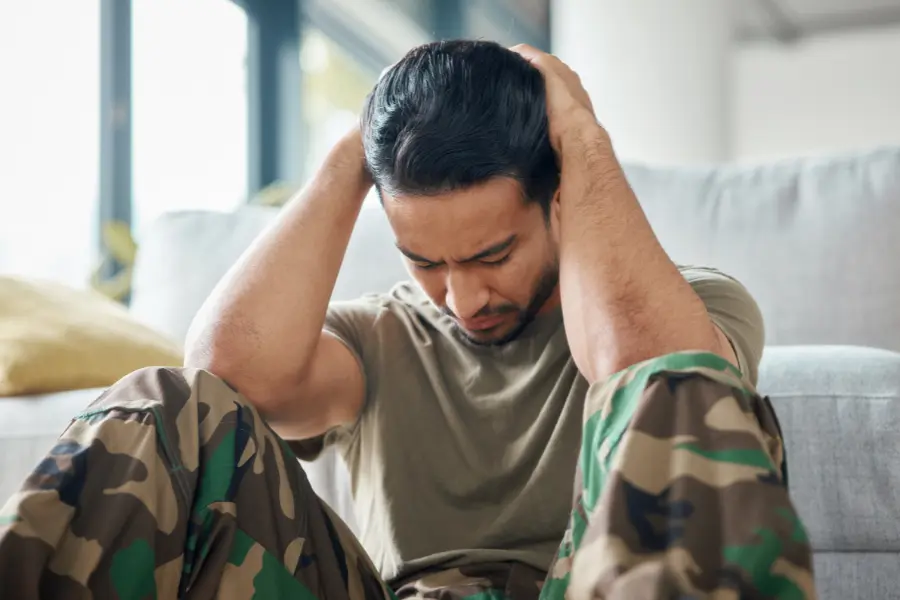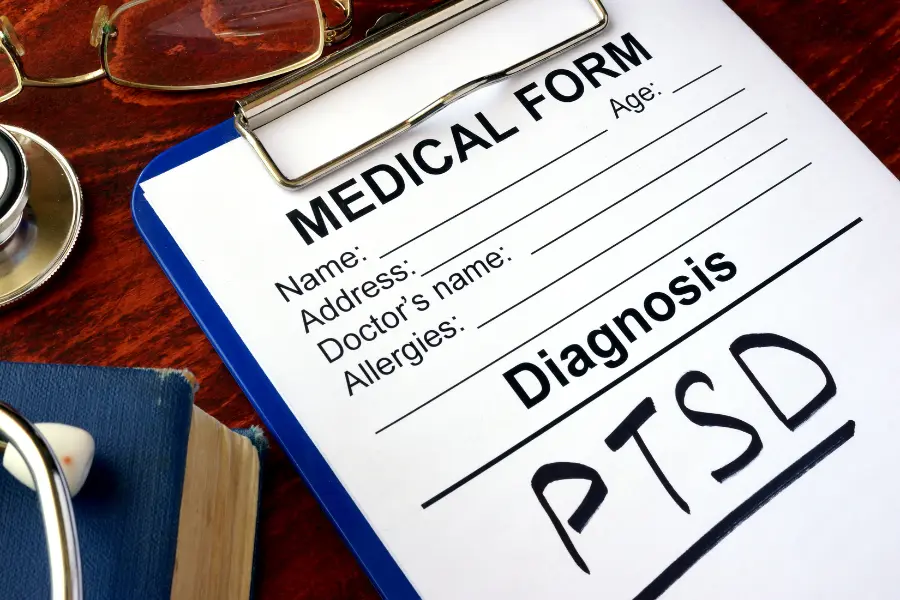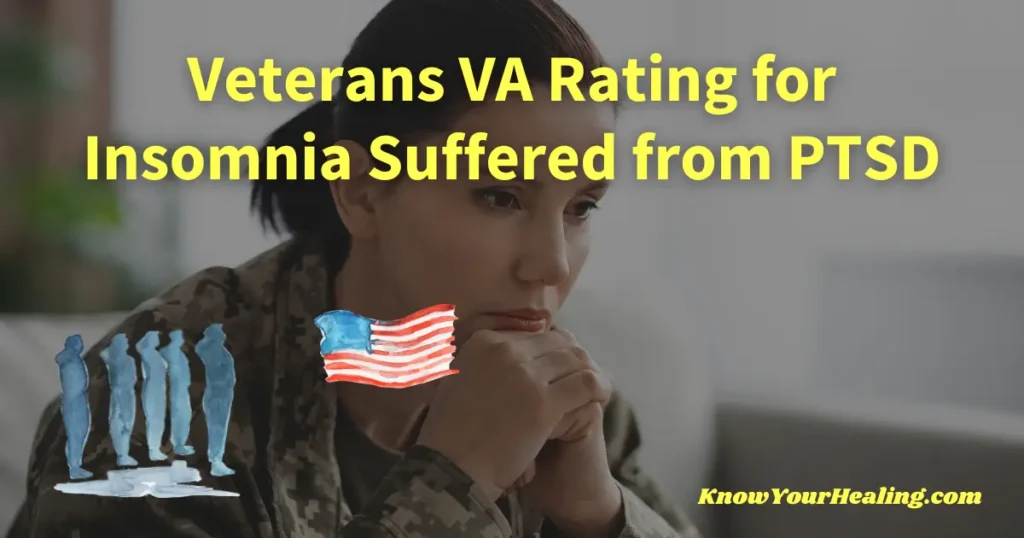The VA rating for insomnia related to PTSD is an important factor for veterans seeking proper compensation for their struggles. Many veterans may not realize that insomnia can significantly impact their VA disability rating.
Understanding how insomnia is evaluated in connection with PTSD can guide them in securing the benefits they deserve.
Veterans experiencing sleep disturbances often have their insomnia rated as part of their PTSD rather than as a separate condition. This can influence how their disability is assessed and compensated.
Insomnia may warrant a higher VA rating when it severely disrupts daily life.
Navigating the complexities of VA claims can be challenging, especially when involving conditions like PTSD and insomnia.
Veterans who gather enough evidence, such as a medical diagnosis and documentation of how insomnia affects their lives, are better positioned to secure an accurate VA rating.
Getting the right support and information can significantly affect their evaluation process.
Understanding PTSD and Its Impact on Veterans

Post-traumatic stress disorder (PTSD) is a severe mental health condition that significantly impacts many veterans’ daily lives.
This condition often leads to challenges such as chronic sleep impairment and can influence one’s ability to maintain social relationships and perform occupational tasks.
The Basics of PTSD in Military Service
PTSD arises from exposure to traumatic events during military service, such as combat experiences or life-threatening situations.
Veterans with PTSD may experience symptoms of insomnia, panic attacks, and mild memory loss. These symptoms can lead to difficulties in maintaining routine activities and relationships.
The Department of Veterans Affairs (VA) assesses PTSD severity through a schedule of ratings ranging from 0 to 100 percent. This rating reflects how PTSD affects a veteran’s social and occupational functioning.
Veterans seeking a VA disability claim for PTSD typically need evidence such as service treatment records and statements from a medical professional or VA examiner.
It’s crucial to establish that PTSD is a service-connected condition to receive VA disability benefits.
Prevalence and Significance of PTSD among Veterans
PTSD is one of the most common mental health disorders among veterans, affecting a large percentage of those who have experienced combat.
The condition is prevalent and carries significant implications for veterans’ quality of life and ability to engage in gainful employment.
Many veterans suffer from insomnia secondary to PTSD, which can further complicate their health and well-being.
Due to its impact, PTSD often requires continuous treatment, including counseling and medication, which is pivotal for managing symptoms like chronic sleep impairment.
The Board of Veterans Appeals plays a role in reviewing cases when veterans seek a higher VA rating for complex conditions, ensuring all relevant medical evidence is considered in the rating decision process.
Insomnia as a Symptom of PTSD

Insomnia is a significant symptom of post-traumatic stress disorder (PTSD), often affecting veterans. It impacts their daily life, increasing stress and reducing quality of life.
This section explores how insomnia is characterized as a sleep disorder and its relationship with PTSD, affecting veterans’ occupational tasks and social relationships.
Characterizing Insomnia Disorder
Insomnia disorder is marked by difficulty falling asleep, staying asleep, or waking up too early.
Veterans often experience chronic insomnia, impacting their mental health condition. This type of chronic sleeplessness can lead to daytime fatigue and decreased productivity, affecting activities such as work and family relations.
Veterans Affairs (VA) ratings for insomnia consider its frequency and impact on daily life.
For veterans, insomnia is reviewed alongside other mental health disorders under the general rating formula, which assigns ratings based on social and occupational impairment.
Medical records and a comprehensive VA examination are crucial in establishing a service-connected disability.
A VA disability claim might recognize insomnia as a secondary condition to PTSD, impacting the overall VA disability benefits the veteran receives.
The Relationship Between PTSD and Sleep Disturbances
PTSD is known for causing severe sleep disturbances, often leading to insomnia.
Veterans with PTSD frequently report nightmares and anxiety-related sleep disruptions.
These disturbances are often documented in VA treatment records as symptoms of the disorder, contributing to the overall VA disability rating.
PTSD-related insomnia can worsen other symptoms like panic attacks and mild memory loss, affecting an individual’s ability to function.
Diagnosing this sleep disorder involves examining service treatment records and possibly conducting a sleep study.
The VA considers such symptoms critical in evaluating a veteran’s claim for an insomnia VA rating.
Establishing a direct or secondary service connection is essential for veterans seeking appropriate compensation, ensuring they receive the VA benefits needed for treatment and management.
VA Disability Ratings Explained

VA disability ratings play a crucial role in determining the compensation and benefits that veterans, like those suffering from insomnia linked to post-traumatic stress disorder, can receive.
This guide explains how these ratings are determined, especially regarding mental health conditions related to military service.
Understanding VA Disability Ratings and Benefits
The VA assigns disability ratings based on the severity of a veteran’s service-connected condition, affecting their daily life and occupational tasks.
Ratings typically range from 0% to 100% in increments of 10%. A higher rating provides more compensation and benefits.
For conditions like insomnia, which may be secondary to PTSD, the rating reflects how symptoms impact tasks and relationships.
Sleep disorders connected to service are evaluated using medical evidence, including VA treatment records and exam results.
A medical professional’s opinion, diagnostic codes, and C&P exams are vital in supporting claims and helping veterans secure the benefits they deserve.
How VA Rates Mental Health Disorders
Mental health disorders, including insomnia, are rated under the VA’s Schedule of Ratings, which outlines criteria for conditions such as PTSD.
The ratings consider factors like social and occupational impairment and how a condition affects a veteran’s ability to engage in routine activities.
For example, chronic sleep impairment and chronic insomnia can lead to higher ratings if they severely disrupt daily living or lead to intermittent periods of inability to perform tasks.
The VA examines symptoms like panic attacks, suicidal ideation, and thought processes.
Such symptoms can influence the decision date and result in a revised rating, reflecting the veteran’s current condition and further supporting their disability compensation efforts.
Eligibility Criteria for VA Claims

To file a VA disability claim for insomnia related to PTSD, veterans must meet specific eligibility criteria.
Understanding how service connections are established and what medical evidence is required can improve the chances of receiving a favorable rating for conditions like chronic insomnia.
Primary and Secondary Service Connection
Primarily, veterans must show that their sleep disorder is directly linked to their military service or as a secondary condition arising from another service-connected disability, like post-traumatic stress disorder.
A direct service connection involves proving that insomnia began or worsened due to military service.
Alternatively, insomnia can be recognized as a secondary service connection if another condition, such as Tinnitus or PTSD, exacerbates it.
Establishing this link could increase the combined VA disability rating, as insomnia affects daily life and occupational tasks.
The VA rates insomnia based on the severity of its impact on the veteran’s daily activities and social relationships.
Sufficient Medical Evidence for VA Claims
Having sufficient medical evidence is crucial for validating a VA disability claim.
Veterans need to provide comprehensive medical records, including details of their sleep disturbances and any related mental health conditions.
This documentation must show how insomnia affects their quality of life, including social or chronic sleep impairment.
A nexus letter from a medical professional can significantly strengthen the claim, linking insomnia directly to service events.
Furthermore, VA examiners will review the veteran’s symptoms, such as chronic insomnia and the impact on routine behavior.
This evaluation helps assess whether veterans qualify for a specific VA disability rating.
Regularly updated VA treatment records also support the continuity and severity of insomnia symptoms.
Evaluating Insomnia and Related Conditions

Insomnia, often linked to PTSD, presents a challenging diagnosis for veterans seeking VA disability benefits.
Accurate assessment involves considering other conditions like anxiety and depression, which often accompany insomnia in such cases.
Role of Sleep Studies in VA Claims
Sleep studies play a crucial role in evaluating insomnia. Medical professionals conduct these studies to monitor sleep patterns and identify disturbances, such as sleep disorder symptoms or obstructive sleep apnea.
They provide critical medical evidence for a VA disability claim related to insomnia.
The results help pinpoint if insomnia is a primary condition or a secondary service connection to PTSD.
For a higher rating on the general rating formula, it is essential to document how insomnia impacts daily life, decreasing work efficiency and causing social impairment.
Veterans can improve their claims by ensuring detailed VA treatment records are part of the submission.
Common Secondary Conditions Linked to PTSD
PTSD often results in chronic insomnia, with veterans experiencing varied secondary conditions.
Anxiety, depression, and panic attacks are common mental health disorders that may develop alongside insomnia. Physical conditions, such as chronic pain, can also exacerbate insomnia symptoms.
Understanding the link between PTSD and insomnia aids in establishing a VA disability rating.
Medical records demonstrating these connections are key.
A nexus letter from a healthcare provider may further substantiate the secondary condition claims, highlighting how conditions like insomnia impair occupational tasks.
This comprehensive approach assists in securing a favorable rating decision from the VA examiner.

Veterans pursuing a VA claim for insomnia linked to PTSD must understand the process. From filing the claim to ensuring the best chances of approval, the steps involve documenting symptoms and establishing a service connection.
Filing a VA Claim for Insomnia due to PTSD
When addressing a VA claim for insomnia related to PTSD, an essential first step is to gather comprehensive medical records.
Veterans should ensure that their PTSD and insomnia are well-documented through detailed assessments by a medical professional.
Evidence should reflect that insomnia is a secondary condition to PTSD, as per the diagnostic code.
Veterans must establish a clear connection to their military service.
A critical component is a nexus letter from a qualified medical expert linking PTSD and insomnia.
This letter serves as proof that the condition is service-connected.
Veterans seeking service-connected disability compensation must submit all required documentation to the Department of Veterans Affairs Regional Office.
An incomplete submission can lead to delays or denials.
Increasing the Likelihood of a Successful VA Claim
To improve the chance of a successful claim, veterans might consider a C&P exam. This examination by a VA examiner helps assess the severity of the conditions.
During this exam, veterans should communicate how insomnia and PTSD affect their daily lives and occupational tasks.
Medical evidence showing chronic sleep impairment, such as sleep studies or records of continuous medication, can strengthen a claim.
Consulting with a VA lawyer might be beneficial, especially for those experiencing challenges in demonstrating a connection between their insomnia and PTSD.
If an initial claim is denied, filing an appeal with additional evidence can be instrumental. This is particularly true if the veteran experiences mild memory loss or other impaired thought processes affecting social relationships.
The Impact of Insomnia on Daily Life and Function

Insomnia can profoundly affect daily life and overall functionality. It often results in social challenges and cognitive difficulties, which can be particularly significant among veterans experiencing post-traumatic stress disorder.
Social Impairment and Quality of Life
A sleep disorder such as insomnia can lead to profound social impairment. Veterans may struggle with maintaining social relationships due to fatigue and irritability, resulting in isolation. This can affect family relations and overall quality of life.
Veterans seeking VA disability benefits for insomnia often report difficulty participating in social activities. Such symptoms can hinder their ability to engage with friends and family effectively.
The VA sometimes evaluates social impairment, understanding its impact when determining a veteran’s insomnia VA rating.
Insomnia’s Effects on Cognitive Function and Mood
Insomnia can also impact cognitive function and mood. Veterans suffering from chronic insomnia may exhibit mild memory loss, decreased work efficiency, and intermittent periods of inability to complete tasks.
This poses challenges in occupational tasks and routine activities, further impacting their mental health condition.
Mood disorders can also arise or worsen due to lack of sleep. Veterans may face mood swings, panic attacks, and heightened stress.
The VA disability rating often considers these aspects, as insomnia might act as a secondary condition linked to PTSD.
Continuous monitoring by a VA examiner can assess the degree of impact on mental health. They often reference medical records and c&p exam findings to ensure appropriate support and compensation.
Treatment Options for Insomnia in Veterans

Insomnia is a common issue among veterans, often linked to post-traumatic stress disorder. Treatment options can vary, focusing on cognitive and medical interventions to enhance veterans’ quality of life and daily functioning.
Addressing insomnia can improve overall mental health and reduce the impact of a service-connected disability.
Cognitive Behavioral Therapy for Insomnia
Cognitive Behavioral Therapy for Insomnia (CBT-I) is a well-established method used to treat sleep disorders in veterans. This therapy aims to change the thoughts and behaviors that cause persistent sleep issues.
Veterans can improve their sleep by addressing behaviors like inconsistent sleep schedules or maladaptive thoughts about sleep. Experienced therapists guide veterans through specific techniques to help manage chronic insomnia.
CBT-I treatment may include sleep restriction, stimulus control, and relaxation techniques. These methods enable veterans to retrain their sleep patterns and achieve better sleep quality.
For those suffering from insomnia secondary to PTSD, CBT-I can be an effective tool to help reduce the overall impact of mental health disorders on their daily lives and occupational tasks.
Medical and Alternative Treatments
In addition to therapy, medical and alternative treatments are available for managing insomnia.
A VA examiner can prescribe medications such as sedatives or antidepressants to alleviate symptoms.
Veterans should consult a medical professional to determine which medications are most suitable for their condition, especially if insomnia is linked to military service as a secondary service connection to PTSD.
Alternative treatments like acupuncture or herbal supplements may also relieve sleep disturbances, although these require careful consideration and consultation with healthcare providers.
Veterans may also explore yoga or mindfulness meditation to improve relaxation and sleep quality.
Combining these approaches with traditional medical treatment can provide comprehensive care and improve overall quality of life.
Advanced Claim Review Processes

Understanding the ins and outs of VA claim processes can help veterans better navigate the often complex system. Focusing on the appeals process and legal representation can be especially crucial for those with service-connected insomnia secondary to PTSD.
Board of Veterans’ Appeals for Claim Disputes
Veterans seeking to appeal a VA disability rating decision related to a sleep disorder, such as chronic insomnia secondary to PTSD, can take their case to the Board of Veterans’ Appeals.
This board reviews appeals and ensures that veterans receive fair evaluations of their VA disability claims.
Veterans must provide thorough medical evidence and service treatment records to support their cases. The board considers symptoms, such as chronic sleep impairment and social impairment, when deciding if a higher VA rating should be granted.
Veterans may submit additional evidence to show how these symptoms affect daily life and occupational tasks. Decision dates vary, but the process aims to address errors that may have occurred at the Department of Veterans Affairs Regional Office.
Utilizing Legal Representation for VA Benefits
Engaging legal representation can be beneficial for veterans navigating the claims process. Experienced attorneys can assist veterans in gathering necessary documentation, such as medical records and nexus letters, to establish a direct or secondary service connection for insomnia.
Legal professionals can also help interpret the VA’s Schedule of Ratings and diagnostic codes to determine eligibility for higher ratings.
By collaborating with legal experts, veterans may improve their chances of obtaining the VA disability benefits they deserve.
A skilled attorney can help clarify complex aspects, such as the interplay between mental health conditions like post-traumatic stress disorder and insomnia, occupational tasks, and the potential impact on individual unemployability.
Additional VA Disability Benefits and Considerations

Veterans receiving a VA rating for insomnia due to post-traumatic stress disorder (PTSD) may also qualify for other disability benefits. These benefits can assist in supporting their daily life and overcoming barriers to employment.
Two key considerations include Total Disability Based on Individual Unemployability (TDIU) and special circumstances affecting veterans’ disability claims.
Total Disability Based on Individual Unemployability (TDIU)
Total Disability Based on Individual Unemployability (TDIU) offers benefits to veterans whose service-connected disabilities prevent them from maintaining gainful employment.
Veterans with a VA disability rating that ties insomnia to PTSD might find TDIU necessary, as chronic insomnia can make it difficult to complete tasks or sustain a work schedule.
To qualify for TDIU, veterans need evidence of their inability to work due to insomnia or related disabilities; this could include medical records and an evaluation by a VA examiner.
A nexus letter from a medical professional may also support their case, strengthening the link between insomnia as a primary or secondary service connection and unemployability.
Special Circumstances Affecting Veterans’ Disability Claims
Veterans with symptoms of insomnia secondary to PTSD may face unique challenges when filing disability claims.
Special circumstances might involve proving insomnia as a service-connected condition and understanding its impact on quality of life.
The VA may assess insomnia using the schedule of ratings for mental health disorders, where chronic sleep impairment and related symptoms are examples of occupational and social impairment.
Obtaining sufficient VA treatment records and service treatment records can help establish the insomnia’s connection to military service.
Veterans should also be aware of the role of a C&P exam to substantiate their claims. Addressing inaccuracies or providing additional evidence swiftly can guide the Board of Veterans to a favorable decision.
Conclusion
VA rating for insomnia due to PTSD is an essential consideration for veterans seeking support.
Sleep disorders can severely impact life, leading to challenges in both personal and professional areas.
Identifying the connection between insomnia and military service is crucial.
Evidence is key for veterans to receive proper ratings.
Showing a clear link between service activities and sleep issues is necessary.
Different conditions like PTSD often result in insomnia, requiring comprehensive documentation to support claims.
Veterans may find it beneficial to explore additional resources.
Frequently Asked Questions
Veterans dealing with insomnia related to PTSD may qualify for VA disability ratings. Understanding how the VA assesses these conditions can help veterans get needed support.
This section covers the details veterans need to know about insomnia ratings.
How is insomnia rated by the VA when it is secondary to PTSD?
The VA considers insomnia secondary to PTSD by evaluating how both conditions impact a veteran’s daily life. They look at symptoms like difficulty falling asleep or staying asleep and how these affect mental health. The VA assigns a combined rating, reflecting the overall impact.
What are the criteria for receiving a VA disability rating for insomnia?
The VA requires medical evidence linking insomnia to military service. Veterans must show how insomnia affects their day-to-day activities. This includes reports from healthcare providers detailing symptoms, treatment plans, and ongoing challenges with sleep.
How can a veteran’s insomnia be linked to service-connected disabilities?
Veterans can connect insomnia to service-related conditions like PTSD or chronic pain. Medical records should document these links. Conditions that manifest during or are aggravated by military service can be critical in establishing this connection.
What are the potential VA disability ratings for insomnia secondary to another condition?
The VA assesses insomnia on a scale from 0% to 100%. Ratings depend on severity and frequency. For secondary insomnia, the combined rating with the primary condition determines the level of benefits a veteran receives. More severe symptoms usually result in higher ratings.
How does the Veteran Affairs evaluate the severity and impact of insomnia on a veteran’s life?
The VA evaluates insomnia severity based on how it interferes with daily routines, work, and social interactions. They consider factors like sleep disruptions and daytime fatigue. Medical assessments and personal statements are used to gauge overall life impact.
What is the process for appealing a VA decision on an insomnia rating?
Veterans can appeal VA decisions if they disagree with their insomnia rating. They must file a Notice of Disagreement to begin an appeal and submit any supporting evidence or documentation. A detailed case review follows, potentially leading to a new decision.




